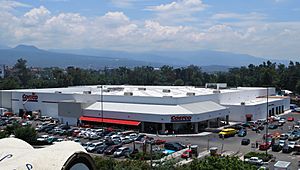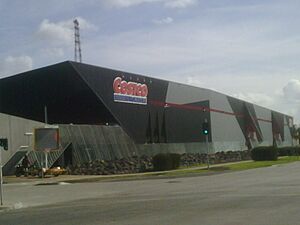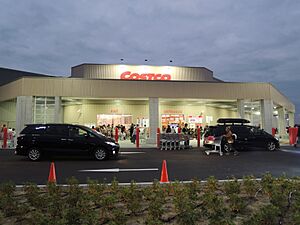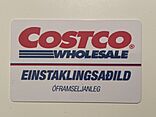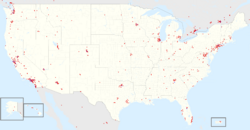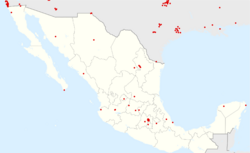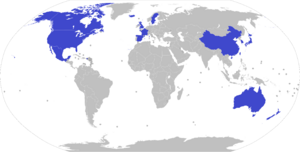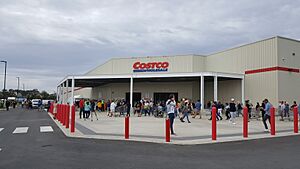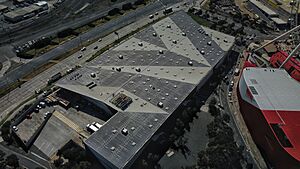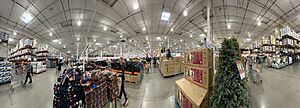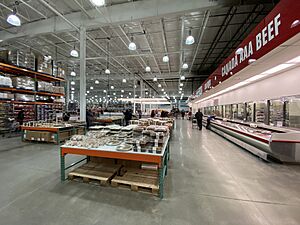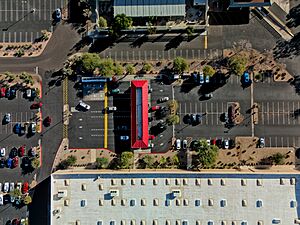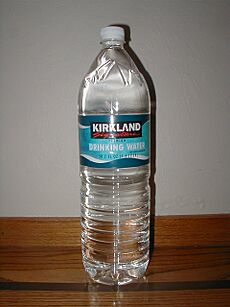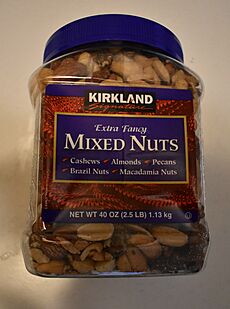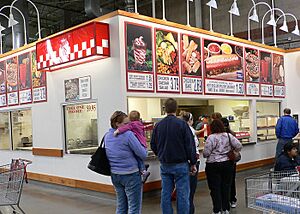Costco facts for kids

Logo since 1997
|
|
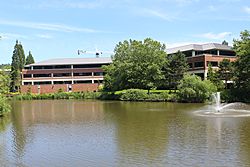
Headquarters in Issaquah, Washington
|
|
| Public | |
| Traded as |
|
| Industry | Retail |
| Founded | September 15, 1983 (as Costco) Seattle, Washington, U.S. |
| Founders | |
| Headquarters |
,
US
|
|
Number of locations
|
876 (2024) |
|
Area served
|
|
|
Key people
|
|
| Brands | Kirkland Signature |
| Services |
|
| Revenue | |
|
Operating income
|
|
| Total assets | |
| Total equity | |
| Members | |
|
Number of employees
|
|
Costco Wholesale Corporation (commonly shortened to Costco) is an American multinational corporation which operates a chain of membership-only big-box warehouse club retail stores. As of 2021, Costco is the third-largest retailer in the world and is the world's largest retailer of choice and prime beef, organic foods, rotisserie chicken, and wine as of 2016[update]. Costco is ranked #11 on the Fortune 500 rankings of the largest United States corporations by total revenue. Costco uses a club warehouse wholesale retailer channel of distribution while also selling their private label brand directly to consumers.
Costco's worldwide headquarters are in Issaquah, Washington, an eastern suburb of Seattle, although its Kirkland Signature house label bears the name of its former location in Kirkland. The company opened its first warehouse (the chain's term for its retail outlets) in Seattle in 1983. Through mergers, however, Costco's corporate history dates back to 1976, when its former competitor Price Club was founded in San Diego, California. As of April 2024[update], Costco has 876 warehouses worldwide: 600 in the United States, 108 in Canada, 40 in Mexico, 4 in Puerto Rico, 33 in Japan, 29 in the United Kingdom, 18 in South Korea, 15 in Australia, 14 in Taiwan, 6 in China, 4 in Spain, 2 in France, 1 in Iceland, 1 in New Zealand, and 1 in Sweden.
Contents
History
Price Club
Costco's earliest predecessor, Price Club, opened its first store on July 12, 1976, on Morena Boulevard in San Diego, California. It was founded three months earlier by Sol Price and his son, Robert, following a dispute with the new owners of FedMart, Price's previous membership-only discount store. Price Club was among the first retail warehouse clubs, beginning with its Morena Boulevard store inside a series of old airplane hangars once owned by Howard Hughes. The store, known as Costco Warehouse #401, is still in operation today.
Price Club's sales model targeted small business owners, selling items in bulk for a discounted price at no-frills outlets that were accessible only with an annual membership fee. The company launched an initial public offering in 1980 and expanded to 24 locations in the Southwest and 1.1 million members by early 1986. Price Club expanded into Canada in 1986, opening a store in Montreal, followed by a Mexico City store in 1992 as part of a joint venture with hypermarket chain Controladora Comercial Mexicana. The company also announced plans to open stores in Spain and Portugal through their Canadian subsidiary.
Costco opens
Jim Sinegal and Jeffrey H. Brotman opened the first Costco warehouse in Seattle on September 15, 1983. Sinegal had started in wholesale distribution by working for Sol Price at FedMart; Brotman, an attorney from an old Seattle retailing family, had also been involved in retail distribution from an early age. During this time, small businesses were given an 8% or 9% discount on inventories. He began his retail involvement as a grocery bagger. A second store opened in Portland in October, and a third in Spokane in December 1983. The company went public in 1985 with 17 warehouses nationally and 1,950 employees. The company was initially headquartered at its first warehouse in Seattle but moved its headquarters to Kirkland in 1987.
The "PriceCostco" merger
In 1993, Costco and Price Club agreed to merge operations after Price declined an offer from Walmart to merge Price Club with their warehouse store chain, Sam's Club. Costco's business model and size were similar to those of Price Club, which made the merger more natural for both companies. The combined company took the name PriceCostco, and memberships became universal, meaning that a Price Club member could use their membership to shop at Costco and vice versa. PriceCostco boasted 206 locations generating $16 billion in annual sales. PriceCostco was initially led by executives from both companies, but in 1994, the Prices left the company to form PriceSmart, a warehouse club chain in Central America and the Caribbean unrelated to the current Costco.
Costco moved its headquarters from Kirkland to Issaquah in 1996; it chose to build a new headquarters campus next to a warehouse store to allow buyers to check sales and merchandise. They had originally planned to move by December 1993 to Redmond, another Eastside city, but delays in road construction near the warehouse site caused the company to reconsider. The former Kirkland headquarters, a 10.7-acre (4.3 ha) campus, was sold in late 1996.
The company began testing store conversions to Costco branding across the Southwestern United States in late 1996. It officially reverted to using the Costco name and stock symbol in February 1997, with all remaining Price Club locations subsequently rebranded as Costco.
Other company milestones
The first Costco warehouse in Seattle was replaced with a new building on an adjacent lot to the north in March 2005; the company was able to arrange to keep the same address for the new building, which was on land acquired from Seattle Public Schools. The original building was demolished and replaced by a parking lot, gas station, and car wash—the company's first—that opened in 2006.
In 2014, Costco was the third largest retailer in the United States. That year Costco announced plans to open an online store in China using Alibaba Group.
Costco announced the opening of 29 new locations in 2016, the most in one year since 2007. Span Construction, led by King Husein, has constructed almost all of Costco's buildings since 1989.
Costco opened its first warehouse in China on August 27, 2019, in Shanghai. The store's opening garnered much attention, which led to its opening day being cut short over safety concerns.
The first Costco in New Zealand was first opened at West Auckland in September 2022, delayed from mid-August due to the economic impact of the COVID-19 pandemic.
Costco today
In the United States, Costco's main competitors operating membership warehouses are Sam's Club (a subsidiary of Walmart) and BJ's Wholesale Club. Costco employs 316,000 full and part-time employees worldwide. Costco had 90.3 million members in 2017. In 2020, Costco had 105.5 million members. In 2021, the company had 111.6 million members. As of November 2023[update], Costco had 129.5 million members.
Costco was the first company to grow from $0 in sales to $3 billion in sales in under six years. For the fiscal year ending on August 31, 2012, the company's sales totaled $97.062 billion, with $1.709 billion net profit. As of 2019[update], Costco is ranked #14 on the Fortune 500 rankings of the largest United States corporations by total revenue. The ACSI (The American Customer Satisfaction Index) named Costco number one in the specialty retail store industry with a score of 84 in 2014.
From December 2013, Costco's board of directors was chaired by co-founder Jeffrey H. Brotman and included James Sinegal, co-founder and director, and two officers of the company: president/CEO W. Craig Jelinek and CFO Richard A. Galanti. On August 1, 2017, Jeffrey Brotman died. As of August 2017[update], James Sinegal and W. Craig Jelinek remained on the board. Jim Sinegal stepped down in 2018.
Locations
As of April 2024[update], Costco has 876 warehouses worldwide:
- 600 in the United States
- 108 in Canada
- 40 in Mexico
- 4 in Puerto Rico
- 33 in Japan
- 29 in the United Kingdom
- 18 in South Korea
- 15 in Australia
- 14 in Taiwan
- 6 in China
- 4 in Spain
- 2 in France
- 1 in Iceland
- 1 in New Zealand
- 1 in Sweden
International locations
Warehouses outside the U.S. are similar to the company's domestic locations, featuring generally identical layout, signage, and even parking lot markings. Food court menus are tailored to international tastes, with meat pies on offer in Australia; poutine in Canada and France; seafood-topped pizza in Asian locations; pastor taco-topped pizzas in Mexico; clam chowder in Japan, South Korea, and Taiwan; plokkfiskur in Iceland; and jacket potatoes in the UK.
In Canada, it is a participant in the voluntary Scanner Price Accuracy Code managed by the Retail Council of Canada.
Largest and smallest locations
In 2005, the world's largest Costco by square feet was warehouse #692 in Hillsboro, Oregon with 148,663 sq ft (13,811.2 m2). In 2015, Costco completed an expansion in Salt Lake City, Utah, making it the new largest Costco at 235,000 sq ft (21,800 m2). Costco is currently working on getting approval to build their new largest ever retail store in Fresno, California at 241,000 sq ft (22,400 m2).
In 2019, Costco opened its biggest store in Canada, in St. John's, Newfoundland and Labrador; the store is 182,000 sq ft (16,900 m2).
In 2011, Costco's highest-volume store was in Seoul, South Korea. In 2018, the store in Taichung, Taiwan, ranked at the top in the number of members and was second in the world in sales volume, behind South Korea's Yangjae store in Seoul. Of the 14 Costco operations in Taiwan, three – Taichung, Neihu, and Chungho – ranked in the top 10 in the world in sales volume.
As of 2019[update], the smallest Costco is in Juneau, Alaska.
Costco Business Centers
Costco Business Centers are warehouses similar to regular Costco warehouses, and are open to all Costco members, regardless of membership type. Their merchandise caters predominantly to enterprises, with a focus on small businesses. Business Centers do not carry most consumer items like clothing, jewelry, media, and tires, while carrying larger quantities and more options for the business products they do carry. More than 70% of the items that can be acquired from a Costco Business Center cannot be found in a typical Costco store. Some locations do have a food court, a gas station, or both. Unlike regular warehouses, most Costco Business Centers have a Print & Copy Center which provides printing professional services. They have large parking spaces for trucks and are capable of delivering goods to businesses in bulk quantities, with a delivery charge of $25 for orders that are below $250. Costco Business Center operating hours are shorter than regular warehouses (usually opening at 7:00 am on Mondays to Saturdays and closed on Sundays), while discounts and coupons for Business Centers are issued separately from regular warehouses.
The first Business Center was a converted Costco warehouse in Lynnwood, Washington that reopened in October 1996 following renovations; the change was made after a conventional Costco warehouse had opened in nearby Everett.
Locations
As of August 2022[update], there are 22 Costco Business Centers in the United States, located in Orlando, Florida; Texas (Stafford, and Dallas); Minneapolis, Minnesota; Phoenix, Arizona; California (Commerce, Hawthorne, Hayward, North Hollywood, Sacramento, San Diego, South San Francisco, Ontario, Westminster, San Marcos, and San Jose); Denver, Colorado; Morrow, Georgia; Bedford Park, Illinois; Hackensack, New Jersey; Las Vegas, Nevada; and Washington (Lynnwood, and Fife). A Business Center in San Marcos, California opened in March 2022.
The first Costco Business Center outside the U.S. opened in Canada in Scarborough, Ontario, in March 2017. In September 2020, the second Canadian Costco Business Centre opened in Saint-Hubert, Quebec, near Montreal. A third Canadian Business Centre opened in the Ottawa neighborhood of Gloucester in March 2021.
Finances
| Business | share |
|---|---|
| Food and Sundries | 40.5% |
| Non-Foods | 25.6% |
| Warehouse Ancillary and Other | 20.5% |
| Fresh Foods | 13.5% |
| Region | share |
|---|---|
| United States | 72.9% |
| Canada | 13.6% |
| Other International | 13.5% |
For the fiscal year 2023, Costco reported earnings of US$6.292 billion, with an annual revenue of $242.29 billion.
| Year | Revenue in mil. US$ |
Net income in mil. US$ |
Price per Share in US$ (year end) |
Warehouses | Employees | Ref(s) |
|---|---|---|---|---|---|---|
| 2005 | 52,935 | 1,063 | 34.96 | 433 | 115,000 | |
| 2006 | 60,151 | 1,103 | 37.73 | 458 | 127,000 | |
| 2007 | 64,400 | 1,083 | 50.26 | 488 | 127,000 | |
| 2008 | 72,483 | 1,283 | 38.20 | 512 | 137,000 | |
| 2009 | 71,422 | 1,086 | 43.68 | 527 | 142,000 | |
| 2010 | 77,946 | 1,303 | 54.02 | 540 | 147,000 | |
| 2011 | 88,915 | 1,462 | 63.06 | 592 | 164,000 | |
| 2012 | 99,137 | 1,709 | 80.99 | 608 | 174,000 | |
| 2013 | 105,156 | 2,039 | 98.67 | 634 | 184,000 | |
| 2014 | 112,640 | 2,058 | 118.86 | 663 | 195,000 | |
| 2015 | 116,199 | 2,377 | 141.43 | 686 | 205,000 | |
| 2016 | 118,719 | 2,350 | 141.82 | 715 | 218,000 | |
| 2017 | 129,025 | 2,679 | 173.55 | 741 | 231,000 | |
| 2018 | 141,576 | 3,134 | 191.93 | 768 | 245,000 | |
| 2019 | 152,703 | 3,659 | 279.64 | 782 | 254,000 | |
| 2020 | 166,761 | 4,002 | 370.85 | 795 | 273,000 | |
| 2021 | 195,929 | 5,007 | 563 | 815 | 288,000 | |
| 2022 | 226,954 | 5,844 | 455.72 | 838 | 304,000 | |
| 2023 | 242,290 | 6,292 | 871 | 316,000 |
Ownership
Costco is mainly owned by institutional investors, who own over 70% of shares. The largest shareholders in December 2023 are:
- The Vanguard Group (9.10%)
- BlackRock (6.90%)
- State Street Corporation (4.21%)
- Fidelity Investments (2.09%)
- Morgan Stanley (1.98%)
- Bank of America (1.73%)
- BNY Mellon (1.24%)
- Norges Bank (1.24%)
- Northern Trust (1.13%)
Business model
Costco is a membership-only warehouse which generates a majority of its revenue from membership fees and a small percentage from retail sales. Customers must buy memberships to access the warehouse and make purchases. This is executed through the direct sourcing and efficient inventory management techniques.
Costco divides its business into three segments: United States Operations, Canadian Operations, and Other International Operations. These three business segments are reported by revenue and operating income. Of the three, the United States Operations was the largest, followed by Canadian Operations.
Sales model
One company rule states that no regular item may be marked up more than 14% over cost and no Kirkland Signature item may be marked up more than 15% over cost. The company runs very lean, with overhead costs at about 10% of revenue and profit margins at 2%. Costco's annual membership fees (US$60/year for Gold Star, US$120/year for Executive as of 2024[update]) account for 80% of Costco's gross margin and 70% of its operating income.
If Costco feels the wholesale price of any individual product is too high, they will refuse to stock the product. For example, in November 2009, Costco announced that it would stop selling Coca-Cola products because the soft-drink maker refused to lower its wholesale prices. Costco resumed selling Coca-Cola products the following month.
Although the brand engages in visible efforts to reduce costs, the stores themselves are expensive. In 2013, Costco spent approximately $80 million on each of the new stores it opened.
The cost is partly driven by the cost of real estate, as each new store means that they need enough space to support a building of approximately 150,000 square feet (14,000 m2) in size, a large parking lot, and often a gas station.
Lighting costs are reduced on sunny days because most Costco locations have several skylights. During the day, electronic light meters measure how much light is coming in the skylights and turn off an appropriate percentage of the interior lights. During an average sunny day, it is normal for the center section of the warehouse not to have interior lights in use. The company has no public relations department and buys no outside advertising. A typical Costco warehouse carries only 3,700 distinct products, while a typical Walmart Supercenter carries approximately 140,000 products.
Rotisserie chickens are a major driver of customer traffic and sales for Costco, which has sold them since 1994 amid the then-rising popularity of Boston Market. In response to the annual growth of per-capita chicken consumption in the United States, Costco opened a factory in Nebraska in 2019 that implemented vertical integration across all aspects of poultry production in a bid to keep their pricing intact while maintaining consistent quality control of them. In some international markets, Costco also offers sushi that is made in-house; the Issaquah warehouse became the first U.S. store to have in-house sushi in 2023.
Costco is known for its "exit greeters", who briefly compare receipts against shopping cart contents as customers exit. They are trained to quickly count cart contents and serve as a form of customer service to verify that customers were charged correctly, have redeemed any voucher-based items (e.g., tickets), and have not missed items placed in their cart's lower racks. Costco has used exit greeters since its first store in 1983.
Online shopping
Costco primarily focuses on getting members to come in to a warehouse for purchases, instead of ordering products online. Due to the COVID-19 pandemic, Costco's online sales increased dramatically, with more online sales growth in 2020 than the previous five years combined.
In November 1998, the company launched Costco Online, its online shopping site. The site expanded to incorporate B2B e-commerce on April 17, 2001.
Instacart offers Costco delivery in a select number of states, including Arizona, California, Colorado, Florida, Georgia, Illinois, Indiana, Massachusetts, Maryland, Minnesota, Missouri, North Carolina, New Jersey, New York, Oregon, Tennessee, Texas, Virginia, Washington, and the District of Columbia.
Similarly, in March 2017, Costco initiated a partnership with Shipt, an online grocery delivery service. Unlike Instacart, Shipt charges its own membership fee, $99 a year or $14 a month, in exchange for free delivery on orders over $35. As of November 2018[update], Shipt offers Costco delivery in select Florida markets.
In October 2017, Costco launched same-day and two-day grocery delivery options for members.
In June 2023, Costco in Iceland opened up for click-and-collect alcohol sales, having previously only been open to businesses.
Products
Costco frequently rotates its inventory, often stocking items temporarily or seasonally. Over the years, Costco has significantly expanded its range of products. While initially focusing on bulk, boxed items easily displayed in store by removing the stretch wrap from a pallet, Costco's offerings now include a diverse array of items of all shapes and sizes. These range from art, books, caskets, and clothing, to computer software, fine wine, furniture, home appliances, electronics, hot tubs, jewelry, and various perishable goods like dairy, baked items, flowers, produce, meat, and seafood. Other items such as solar panels, tires, and vacuum cleaners have also found their way into Costco's product lineup.
Beyond products, many Costco warehouses feature additional services including gas stations, pharmacies, hearing aid centers, optometry and eyewear departments, and tire installation garages.
Gold bars
Costco began selling one-ounce, 24-karat gold bars in October 2023. While typically selling for about 2% above the spot price, Costco offers 2% cash back for executive members and another 2% for users of certain credit cards. Thus it is seen as a low-profit venture for Costco and a loss leader for increasing store memberships.
Kirkland Signature
Kirkland Signature is Costco's private label brand, featured on a wide array of products sold across Costco's warehouses and its website. Launched in 1995, the brand takes its name from the original location of Costco's corporate headquarters in Kirkland, Washington. It accounts for nearly one-third of the company's sales and outpaces the growth of Costco's overall sales.
The aim of the Kirkland Signature brand was to offer products with brand name quality at discounted prices. Recognizing the typical consumer skepticism common with private labels, Costco has adopted a strategy of co-branding certain items with well-known manufacturers to bolster consumer trust. Notable co-branded products include those from Chinet, Jelly Belly, Keurig Green Mountain, Ocean Spray, Stearns & Foster, and Starbucks. Additionally, while some Kirkland Signature products maintain a generic label, they are produced in partnership with recognized companies such as Duracell and Niagara Bottling. The brand often uses simple, minimalist packaging, reflecting its focus on offering high-quality products at affordable prices.
Services
Concierge service
Costco offers a free "concierge" service to members who purchase electronics, to help answer questions regarding setup and use and avoid potential returns due to not understanding how to use the products.
Costco Auto and Home Insurance
Costco has an agreement with CONNECT, powered by American Family Insurance, for auto insurance, home insurance and umbrella insurance.
Costco Optical
Costco Optical ranks as the fifth-largest optical company in the US, as of 2015[update]. Optometrists working at Costco locations will see patients without Costco memberships, although a membership is required to fill a prescription at the optical department.
Costco Travel
Costco Travel is a wholly owned subsidiary of Costco Wholesale and offers leisure travel to Costco members of the United States and Canada.
The program offers vacation packages to the Caribbean, Europe, Florida, Hawaii, Las Vegas, Mexico, and the South Pacific.
Food service
In 1985, Costco started to sell freshly prepared food through a hot dog cart at its original Seattle warehouse. Most Costco locations now have a food court. They can be indoors or outdoors, but the menu is essentially the same: hot dog with drink (one of the most popular items), pizza, frozen yogurt/ice cream, Pepsico beverages, baked items, and sandwiches. Costco offers its signature quarter-pound 100% beef hot dog and 20 US fluid ounces (590 ml) drink (with refills) for US$1.50, the same price since 1985. Some US locations also offer Polish sausage or bratwurst in addition to hot dogs, at the same $1.50 price. The hot dog sausages were kosher and supplied by Hebrew National and Sinai Kosher until 2009, when supply issues and low profit margins led Costco to start producing them in-house under the Kirkland Signature label to maintain the $1.50 price. In Australia and New Zealand, the hot dog is made of pork and is sold with a large soda for $1.99 (AUD/NZD). In Canada, the price for a hot dog and soda with refills is C$1.50. In Mexico, the hot dog is made of 100% beef and includes a drink (with refills) for MXN$35. In the UK, the hot dog is also made from beef and customers also get a drink (with refills) for £1.50. Costco sold more than 137 million quarter-pound (113 g) hot dogs in its food courts in 2017. In Taiwan and Japan, the hot dog is made of pork as well. Japan's price for their 120-gram hot dog & refillable 600-ml drink is ¥180.
As of April 2024, cheese or pepperoni pizza (along with pre-ordering of full pizzas to take home), chicken bakes, ice cream (vanilla, chocolate, or twist), ice cream sundae, fruit smoothies, latte freeze (without chocolate), mocha freeze (with chocolate), and chocolate chunk cookies (replacement of twisted churros) are offered at all United States locations. Some food court items are only available in certain countries. For example, the bulgogi bake and mango boba tea are only available in Australia, Taiwan, Korea, and Japan; poutine is available in Canada and France. There are, however, temporary menu items available exclusively in several countries, like the pastor taco-topped pizzas in Mexico.
| Original Item | Replacement Item |
|---|---|
| Veggie/Combo Pizza | No longer offered (this includes the discontinuation of the "Italian Sausage" pizza topping as well) |
| Frozen Yogurt | Vanilla ice cream (with addition of chocolate sauce sundae) |
| Turkey Provolone | No longer offered |
| Twisted Churro | Replaced with dual-flavor churro in late 2020/early 2021, name remained same but was discontinued and was replaced by chocolate chunk cookies |
| Chicken Caesar Salad | Has resumed at locations |
| Chicken Bake | Replaced with factory-made item of same name, no longer hand-made in store (at most locations) |
| Sauerkraut (topping) | No longer offered |
| Deli Mustard (condiment) | |
| Relish (condiment) | Offered in select locations, expected to resume at all locations (no time period for return) |
Due to slow sales, in 2009, the pretzel was replaced by the churro. In April 2013, Pepsi replaced all Coca-Cola fountain drinks at U.S. locations because Coke had raised its prices; this helped keep the hot dog combo with soda at its original US$1.50 price.
Costco started selling a cheeseburger with a 1⁄3-pound (150 g) patty at select stores across Western Washington and Southern California in mid-2017 as a test item, with comparisons drawn to those of Shake Shack. The cheeseburger was not successful; its availability only spread to around a dozen locations before it was discontinued in 2020.
Diced onion was discontinued in March 2020 but returned as a topping in May 2023.
Costco credit card
On April 1, 2016, in US, Citigroup became the exclusive issuer of Costco's branded credit cards. Prior to that, Costco credit cards had been issued by American Express since 2001, and Costco accepted only American Express cards for credit transactions. After the switch of its co-branded cards to Citi, Costco ceased accepting AmEx and began exclusively accepting Visa. AmEx cited the reason for the split that Costco was asking for lower transaction fees than AmEx was willing to grant. In Canada, Costco ended its AmEx relationship in 2014, and starting in 2015, it partnered with Capital One Mastercard for branded credit cards. In 2020, Capital One announced it would be ending the partnership in late 2021. It was announced that beginning in March 2022, Costco will begin a partnership with CIBC Mastercard. Costco branded credit cards from both issuers also serve as alternate Costco membership cards, with a customized reverse side containing membership info.
Costco Audiobook App
In March 2021, Costco started selling audiobooks and launched a corresponding iOS and Android app to listen to purchases. The app is free; however, the books are exclusive to Costco members. The retailer sells audiobooks in bundles grouped by genre or author, with prices ranging from $5 to $50. Audiobooks are currently only available at U.S. locations.
Labor relations
Employee rights
While some former Price Club locations in California and the northeastern United States are staffed by Teamsters, the majority of Costco locations are not unionized, although there was a drive in 2012 to unionize some locations in Canada. The Teamsters claim that over 15,000 Costco employees are union members. The non-union locations have revisions to their Costco Employee Agreement every three years concurrent with union contract ratifications in locations with collective bargaining agreements. The Employee Agreement sets forth such things as benefits, wages, disciplinary procedures, paid holidays, bonuses, and seniority. The Employee Agreement is subject to change by Costco at any time and offers no absolute protection to the workers. As of June 2022, non-supervisory hourly wages ranged from $17.50 to $28.45 in the U.S., $16.00 to $28.70 in Canada, and £9.75 to £13.90 in the United Kingdom. In the U.S. as of 2005[update], eighty-five percent of Costco's workers had health insurance, compared with less than fifty percent at Walmart and Target. Health benefits include coverage through Aetna, remote primary care through Teladoc, second opinions and clinical navigation by Grand Rounds, varieties of health insurance agencies with Custom Benefit Consultants Inc. (CBC), and wellness coaching by Omada.
In February 2021, Costco announced that it would be raising the starting rate for its hourly store workers in the United States to $16 an hour. Costco has been actively raising their minimum wage starting with $14 during 2018, and into $15 during 2019. They further add that 20% of their hourly employees will be subject to the minimum wage change.
A location in Norfolk, Virginia, unionized with the Teamsters in 2023. The vote in Norfolk was the first successful Costco union drive in over twenty years
Contractors
Costco contracts exclusively with two independent companies to provide employees for product demonstrations (e.g., food samples) at Costco stores: Club Demonstration Services (CDS) and Warehouse Demo Services (WDS). Demonstration employees receive a pay and benefit package that is less than that of Costco employees. As of August 1, 2017[update], demonstrations/samples are provided by CDS in Canada. Product demonstrations at Costco stores in the United States were halted in March 2020 amid the COVID-19 pandemic, with some Costco CDS employees shifted to cleaning tasks before all were laid off when CDS temporarily ceased operations the following month; they were rehired as Costco started resuming demonstrations at select stores in June 2020, with all U.S. stores resuming demonstrations by June 2021.
Discontinued concepts
Costco Home
The first Costco Home warehouse opened in December 2002, in Kirkland, Washington. The warehouse's concept was to combine the value, setting and members-only elements of Costco's warehouse clubs with the product array one would find at an upscale home store, such as Fortunoff or Crate & Barrel. The Costco Home warehouses sold furniture, housewares, kitchen products and accessories from higher-end brands such as Lexington, Ralph Lauren and Waterford in a warehouse-club setting. A second warehouse opened in 2004 in Tempe, Arizona.
On April 2, 2009, the company announced that it would be abandoning its Costco Home concept, closing the two existing stores in Kirkland, Washington and Tempe, Arizona on July 3, 2009, and abandoning plans for a third warehouse in Portland, Oregon.
Costco Fresh
A grocery-centered format, named Costco Fresh, was announced in September 1999 for a 75,000-square-foot (7,000 m2) two-story space in Manhattan, New York City. The company pulled out of an agreement to build the Manhattan store later that year after cost increases and local protests. The concept was revived in late 2002 for a store in Bellevue, Washington, near its Issaquah headquarters, at a former Kmart. The new store would primarily sell fresh produce, meats, seafood, and baked goods instead of bulk items, but would also have several features from normal Costco warehouses; it would also have a modified logo, with a fruit stem growing from the first "o" in the Costco name. The concept was dropped the following year, but the company retained interest in building a normal Costco store at the Bellevue site until 2008, when they abandoned the plans due to zoning regulations that would have required daylighting an underground creek.
See also
 In Spanish: Costco para niños
In Spanish: Costco para niños
- Bulk foods
- Costco bear
- Costco Wholesale Corp. v. Omega, S. A.
- Price Club
- Retail
- Wholesaling



